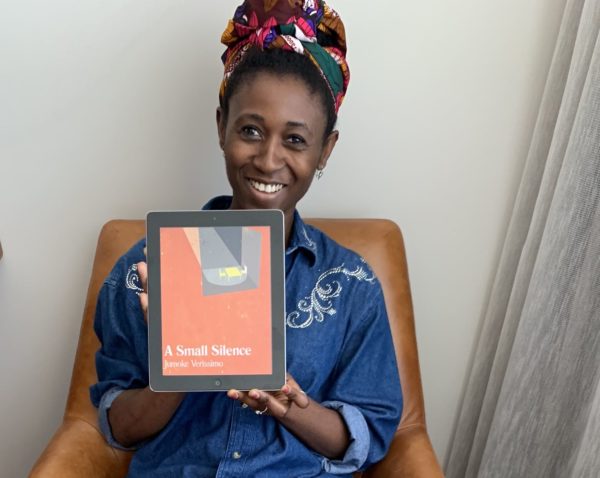
UPSHOT: Stories of Financial Futures is an anthology of 7 science fiction stories with financial themes. The stories were published on January 18, 2021. South African writer and journalist Lauren Beukes curated the anthology for the investment services company, RisCura, working with their investment experts and a star-studded team of African authors from South Africa, Nigeria, and Zimbabwe. Though the stories explore subjects and concepts that are universal, they are largely African futures.
The anthology explores a range of important financial and economic concepts through science fictional, near-future extrapolation to, as the introduction states:
…pose important questions about what could happen if we… care or don’t care about the investment decisions we make. Because when we imagine what the future might hold, we can better define the upshot… this isn’t only about money and numbers, it’s about the lives and futures of all the people who are impacted…
On that front, they succeeded wonderfully. Every one of these stories is strong, ties in perfectly with the theme of the anthology and contributes to make it a thoroughly enjoyable and thought-provoking whole. Individual stories shine and some will probably get more attention than others, but the vision of the anthology and its overall cohesion are great strengths. I prefer such themed collections to more loosely collected work with no unifying theme. UPSHOT is an excellent accomplishment that all involved should be proud of.
Here are my thoughts on each story in the collection.

“Pre-loved” by Charlie Human [Read]
“Pre-loved” literalizes the idea of children as investments, something many people already consider them to be, but in this case, they are managed like other financial investments, by a firm (Child Investment Services) and subject to contracts, performance reviews and most chillingly, transfers for underperforming assets. Charlie Human does a great job of introducing the world, the stakes and steadily building tension toward the finale. It is a wonderful story, with a clever conceit and crisp prose crafted by a skilled hand.

“Last Shot” by Angela Makholwa [Read]
How do you tell a compelling story about ostensibly uncompelling subjects like investments, inflation, and retirement planning? You do it with style. This story is full of big characters, vivid descriptions and stimulating dialogue following the final scheme of a wild investor riding waves of money on the investment sea – with highs and lows as he heads toward retirement. While the prose here is not as strong as some of the other stories, it is full of clever touches and should be read with your imagination turned up full volume. It would probably make a great short film.

“Undercurrency” by Sam Beckbessinger [Read]
Zooming in on the hot-button topic of climate change, energy transition and sustainable investment, “Undercurrency” follows a South African woman’s attempt to build her company, growing underwater kelp for biofuel while falling in love and learning about the complexity of doing the right thing. The voice in the story is strong, the description of the romance, while quick, feels natural and the descriptions of the science and the diving are vivid, accurate and wonderful. This is one of my favorite stories in the anthology (possibly partly because I am an engineer in the energy industry and an avid diver, therefore biased).

“Blow Up Your Life” by Bongani Kona [Read]
Bongani Kona’s story about a young woman caught in debt slavery and put to the mercy of a live audience, autopsying her life for their entertainment and a chance at freedom is, I think, the most emotionally moving in the collection. Kona frames the story cleverly, making the reader almost a participant in this game, almost a member of the audience. Through sharing the story of how she came into debt, we learn how the lack of economic protection puts people in positions where they must make impossible choices. It’s a brilliant story.

“Rest in Parys” by Mohale Mashigo [Read]
What happens when you want to retire, but the government won’t let you? Mohale Mashigo’s story follows a daughter who is trying to help her mother fake her death in order to retire early from the workforce in a south Africa overrun by poorly implemented digital surveillance tools and experiencing longer lifespans than pension plans anticipated. This is a clever story full of extrapolation of real-life trends. Its written very well and it is full of tension and suspense that builds to an excellent ending.

“Elegba’s Valley” by Tade Thompson [Read]
An intriguing take on one of the most increasingly compelling economic questions of our time – universal basic income (UBI). A UBI experiment set in a characteristically chaotic Nigeria with a collapsed economy (unfortunately not far from reality given current trends) full of desperate people, opportunists, hustlers, optimists, violent schemers, and corrupt politicians was always going to be fascinating. But in the expert hands of Tade Thompson, the story is even better you’d expect. Its fast paced – cutting in and out of scenes at just the right points, full of sharp dialogue, astute observations, and colorful characters. It is quite possibly the most entertaining in the anthology.

“According to Plan” by Sam Beckbessinger [Read]
Exploring a world where AIs running machine learning algorithms manage our finances for us, ensuring we hit our goals according to plan, Sam Beckbessinger’s second story in the anthology in an interesting one. It follows a woman trying to go on an unplanned, expensive, but emotionally important trip as the AI based on her own behavior tries to stop her. It’s a well-written story that is funny in places, moving in others, consistently introspective and ends on a questioning note about balance and the role of human control.
***
Overall, UPSHOT brings together a varied but cohesive set of great narratives mostly set in Africa. As Lauren says in her foreword, “I picked some of the best writers I know, whose work is bold and imaginative, deeply human, and also has something to say about who we are in the real world.” And it shows. There is a balance of male and female authors here (3:3), which is nice to see. While it would have been nice to see a bit more geographical coverage in the stories (North and East Africa, perhaps), the universal nature of ideas explored minimizes the impact of this limitation. The notes on the financial concepts that are included at the end of each story are illuminating and help add new dimensions to the stories.
In the end, this is a well-conceived, unique, and wonderful addition to both the global and African speculative fiction canon, themed around something that is universal, something that affects the quality of our lives and futures – our finances and economic systems. Because finance and economics, despite their apparently arcanist appearances, are really about how we, as humans, try to understand, communicate and manage things that are of value to us.








COMMENTS -
Reader Interactions